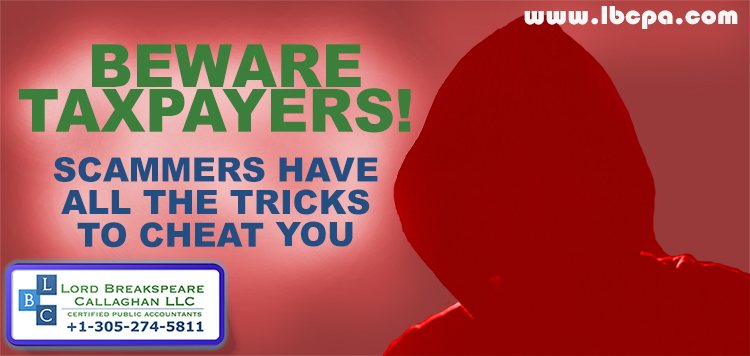LBCPA News 
Click here to go back
Knowing How Scammers Pose as the IRS Can Help Taxpayers Protect Themselves

Crooks are always looking for new ways to scam unsuspecting taxpayers. Scammers impersonate the IRS by phone or email, in person, or by mail or delivery service – and cost people their time and money. By staying vigilant against schemes and scams, taxpayers can protect themselves.
Scammers can pose as the IRS by mail – taxpayers should know the facts
One of the newest and more devious schemes involves mail coming in a cardboard envelope from either a delivery service or the United States Postal Service (USPS). The enclosed letter includes the IRS masthead and wording that the notice is "in relation to your unclaimed refund." The contact information does not belong to the IRS, but the mailing looks official. This scheme seeks sensitive personal information from taxpayers – including driver's license photos – that can be used by identity thieves to steal the taxpayer's refund and other sensitive financial information.
It's now easier to spot when it's a scammer at the door and not the IRS
Scam artists may also appear at the door posing as IRS agents, creating confusion for not just the taxpayers but also local law enforcement agencies. As this scam has grown, taxpayer confusion about home visits by IRS revenue officers has increased.
To help combat these scams, the IRS recently announced that it is ending most unannounced visits to taxpayers by agency revenue officers. In place of the unannounced visits, revenue officers will instead contact taxpayers through an appointment letter, known as a 725-B Letter, and schedule a follow-up meeting. This will help taxpayers feel more prepared when it is time to meet.
Taxpayers who receive a request from IRS in the mail or by phone can always contact IRS customer service to authenticate it.
Scammers may also contact taxpayers electronically
Taxpayers should be on the lookout for a summer surge of tax scams as identity thieves continue sending email and text messages promising tax refunds or offers to help "fix" tax problems. They may pose as the IRS or tax professionals, urging the taxpayer to click fraudulent links so the identity thieves can steal valuable personal information.
Taxpayers should remember: the IRS never initiates contact regarding a bill or tax refund by email, text or social media.
If you have any questions regarding Essential Business Accounting, Domestic Taxation, International Taxation, IRS Representation, U.S. Tax Implications of Real Estate Transactions or Financial Statements, please give us a call at +1-305-274-5811.
Source : IRS






